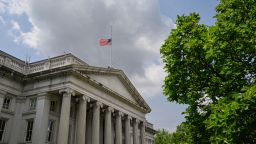President Joe Biden is expected to meet Tuesday with congressional leaders on the debt ceiling limit following “productive” staff-level negotiations over the weekend, two sources familiar with the talks told CNN on Sunday, as the US barrels toward a deadline that could come as soon as June 1.
Negotiators have been able to pinpoint some areas on which congressional staff and the White House can find common ground, including revising the permitting process, rescinding unspent Covid-19 relief funds and potentially cutting spending, the sources said.
Biden and the top four congressional leaders – House Speaker Kevin McCarthy, House Minority Leader Hakeem Jeffries, Senate Majority Leader Chuck Schumer and Senate Minority Leader Mitch McConnell – held talks on the debt limit last week in the Oval Office. Tuesday’s meeting, which has not yet been officially confirmed, according to the sources, comes after a planned Friday meeting was postponed as the staff-level talks continued.
Deputy Treasury Secretary Wally Adeyemo told CNN’s Dana Bash on “State of the Union” on Sunday that talks between the two sides have been “constructive.”
Biden, Adeyamo said, “looks forward to getting together with the leaders to talk about how we continue to make progress.”
Biden himself indicated on Sunday that he expected principal-level debt ceiling discussions to take place Tuesday.
“We’re working on it right now,” he said in brief remarks to reporters as he completed a bike ride in Rehoboth Beach, Delaware.
There is still not a clear path forward to avoid a default with just four more days before June 1 when both the House and Senate are scheduled to be in session. Biden also confirmed Sunday that he expects to depart Wednesday for Hiroshima, Japan, for the G7 summit.
“That’s my plan as it stands now,” he told reporters in Rehoboth Beach.
It’s become increasingly clear that some spending cuts must be included for a deal to materialize, one of the sources said, and that point of discussion has been the main sticking point in negotiations so far.
Biden said Sunday that he was waiting to hear Republicans’ exact proposals on work requirements for certain government aid programs. He said he has voted in the past for “tougher aid programs” that are now law but “for Medicaid, it’s a different story.”
White House spokesperson Michael Kikukawa later elaborated on the president’s answer, saying in a statement that Biden would evaluate the GOP proposals guided by the principle that they would “not take away people’s health coverage” or “push Americans into poverty.”
Negotiators recognize they will likely need to have an outline of a deal by the end of the week to ensure a bill can pass through Congress by June 1, the sources said, but they also think there are potential congressional tools that can be used to speed up the process if needed. The sources did not specify what those tools are.
Adeyemo reiterated Sunday that the US “can’t” default on its debt but declined to provide details on areas of agreement. He echoed Treasury Secretary Janet Yellen’s assessment that default could happen “as early as June 1” but said it “can be sometime in early June,” calling on Congress to act as he warned that default would be “catastrophic.”

Pressed by Bash on the timing of a deal following McCarthy’s call for an agreement in principle by early this week and business leaders like JPMorgan Chase’s Jamie Dimon warning of market panic in the absence of a deal, Adeyemo said Biden “believes we should raise the debt limit as soon as possible.”
“Because it’s not only financial markets, but the (University of Michigan) survey of consumer sentiment last week showed that consumers are now worried about the debt limit – it’s affecting the way they’re spending,” Adeyemo said.
Meanwhile, top Biden economic adviser Lael Brainard on Sunday echoed previous White House comments on preferring a whole deal rather than a short-term fix.
“Short-term is not a fix. It is not really addressing that core uncertainty that CEOs are talking about. It’s just really important to take default and address it, and Congress has the tools to do that,” the director of the National Economic Council said on “Face the Nation” on CBS.
Biden expressed optimism Sunday for an eventual agreement.
“I remain optimistic because I’m a congenital optimist. But I really think there’s a desire on their part, as well as ours, to reach an agreement. I think we’ll be able to do it,” he said in Rehoboth Beach.
The president had indicated last week that he was prepared for talks to go down to the wire.
“I’ve been involved in negotiations my whole career,” he told CNN during a trip to New York. “Some negotiations happen at the last second, some negotiations happen way ahead of time. So, we’ll see.”
Biden resurfaced last week the controversial idea of lifting the borrowing cap without Congress by invoking the 14th Amendment, which some legal experts argue gives the president the authority to order the nation’s debts to be paid regardless of the debt limit Congress sets.
But using the 14th Amendment to let the Treasury Department borrow above the debt ceiling to pay the nation’s obligations would almost certainly prompt a constitutional crisis and swift legal action.
Asked Sunday whether the administration would consider invoking the 14th Amendment in the absence of a deal with Congress, Adeyemo said, “What the president said was that he did not think the 14th Amendment would solve our problems now. The only thing that can solve our problems now is for Congress to lift the debt limit.”
This story and headline have been updated.
CNN’s Arlette Saenz and Jack Forrest contributed to this report.







